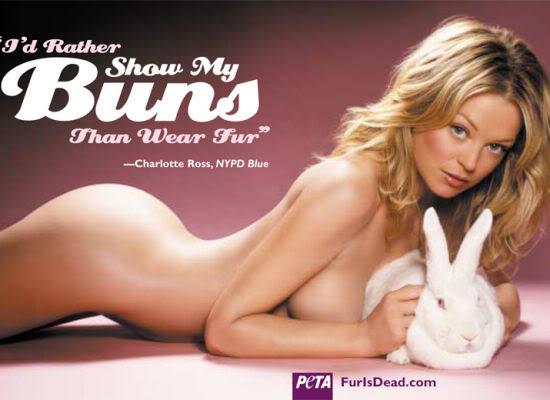Content Warning: Discusses pornography and sexism.
Not Safe for Work: Contains coarse language and sexually explicit subject matter.
PETA posted on Vegan Feminist Network today in response to my article that deconstructs their “Veggie Love Casting” campaign. The campaign depicts young women in bikinis and high heels performing oral sex and other sex acts on vegetables “for the animals.” The statement is reproduced here. I have emphasized the problematic statements and will unpack them below.
The smart, compassionate women who participated in this spot choose to do so because they supported the idea and wanted to take action to help animals. PETA admires them for that and would never tell them that they must behave a certain way in order to gain someone else’s approval. PETA applauds all that everyone does to help animals and attempts to have something to appeal to everyone.
Not everyone agrees with all of PETA’s tactics–and they can choose not to show our videos if they wish–but surely we can all agree that it’s more effective to focus our time and energy on animal abusers rather than bickering with one another.
If you want to learn more about PETA’s other campaigns, or see our ads featuring men, please visit http://www.PETA.org. Thanks again for all you do to promote vegan living and make the world a kinder place for animals.
PETA claims that it did not tell the women to engage these behaviors, but this is a disingenuous justification. Obviously, PETA designed the campaign and hired the participants. This was not a spontaneous grassroots movement to promote vegetable sex for Nonhuman Animals. For that matter, is having sex with cucumbers what women are supposed to do if they want to help animals?
In one way, PETA is correct to say that women are not “told” to engage these behaviors. This is because PETA is normalizing sexist advocacy as female-appropriate advocacy. Female-identified activists increasingly enter the Nonhuman Animal rights movement with an understanding of what is to be expected of them (Gail Dines refers to this socialization phenomenon as “porn ready”). Pornified campaigning is now normalized in the political imagination of the movement. It has become taken for granted as useful, despite social psychological research demonstrating that it is not only ineffective, but also counter-productive.
The tropes embedded in PETA’s response work to protect this normalcy and thus warrant discussion.
1. Choice
“Choice” is a loaded concept that generally works to detract from structural inequality and places responsibility on the individual. It hides privilege and reinforces oppression.
Women “choose” to work in porn because a patriarchal society gives them extremely limited options. Women make this “choice” because they are raised in this society to understand that their worth is tied up in their sexual attractiveness and their sexual availability (unlike men who are taught that they can succeed with strength, leadership, intelligence, wit, etc.).
Most porn actresses come from low income and/or abusive households and have extremely short careers (about 3 years, a time span that has been declining dramatically). The vast majority of porn actresses make very little money. We’re talking about a few hundred bucks for each movie, with a movie deal every few weeks or so. Once they’ve “done it all,” they’re spent, and no longer of use to the industry. Sound familiar? That’s exactly how humans treat layer hens and dairy cows: as expendable sexual resources. Women continue to consent to increasingly degrading, painful, or dangerous sex acts in order to keep in the game as long as possible. The industry exposes women to these precarious and unsafe work conditions with zero job security. If this is the “choice” available to women, something is seriously awry with our labor system.
I’m not blaming these actresses (advocates?) who work for PETA. They’re just doing their job, trying to make a living. Some probably even enjoyed themselves and had fun participating. Instead, I’m blaming the patriarchy that raises women as resources for men. I’m blaming a social movement that is supposed to be about peace but instead exploits women’s vulnerability for fundraising. Under a patriarchy, the rules of the game are rigged to benefit men at the expense of women (and other vulnerable populations, including Nonhuman Animals). All women are products of a patriarchy that grooms them to believe: “Your social worth = Your sex appeal.”
“Choice” relies on a very narrowly defined set of options that patriarchy allows women. If we want to have a serious discussion of “choice,” I suggest we get a straight answer from PETA as to why they intentionally choose women for fundraising and media attention, and why women are disproportionately placed in degrading scenarios, oftentimes (though not in this case) simulating the horrific suffering and death of a Nonhuman Animal by drawing on scripts of violence against women. Like any pornography, PETA campaigns sexualize the humiliation and hurt of women.
2. Appealing to a Wide Audience
The demographics likely attracted to pornography are not likely to be interested in seriously engaging social justice. Pornography further entrenches oppression and reinforces the notion that some persons are objects of resource to other, more privileged persons. Hardly the type of framework we would expect to challenge speciesism. Again, research demonstrates that PETA’s campaigns actually repel viewers who can easily recognize that women are being demeaned.
3. Cricism of Rape Culture as “Bickering”
One in 3 women will be raped, beaten, or otherwise abused at least once in their lifetime. This violence is strongly tied to misogynistic media, and PETA both creates and promotes misogynistic media. To refer to feminist criticism of this systemic violence as bickering is insulting and trivializing. Standing up against the violence that I endure, the violence that millions of women endure, is not bickering, it is social justice in action.
4. Men vs. Women
We do not live in a post-gender/post-feminist society. The bodies of men and women are not viewed or treated similarly. One cannot say, “We use men, too!” with accuracy. It will not negate the misogyny being engaged in the majority of PETA’s outreach. Ninety-six percent of the sexual objectification that occurs in the media depicts women. Women are also many, many times more likely to be victims of rape, sexual abuse, and domestic violence. It is unfair to disregard sexist depictions of women simply because a man’s body is used from time to time.
This argument is particularly nonsensical in PETA’s case. PETA’s advertisements featuring men by and large depict men who are in command over their social space, and their power and status is reinforced. Some of their ads depict men as being silly, Again, there is no serious sexism going on. We find these ads silly because men are so rarely sexually objectified and portrayed in a submissive position. Men are not depicted in sexually submissive positions or as victims of violence, only women are.
Take, for instance, this image of a Bollywood actor advocating for PETA. Notice his confident gaze into the camera, his power over the situation, and his ability to control the space around him and enact change. Notice the posture that depicts confidence.
In contrast, examine this typical PETA ad depicting a naked woman. She is shown in a submissive position, vulnerable, not on her feet, at the mercy of the viewer. Her eyes do not meet the camera directly, but look up from a down turned face. She gently touches the rabbit; there is no command over her space. Her buttocks are raised to denote sexual availability.
The argument that sexism is nonexistent in PETA’s campaigning because nude men are occasionally used as well is a red herring.
We cannot end the objectification of Nonhuman Animals with the objectification of women. We cannot end violence against Nonhuman Animals with violence against women. It’s time to decolonize the activist schema.
 Dr. Wrenn is Lecturer of Sociology. She received her Ph.D. in Sociology with Colorado State University in 2016. She received her M.S. in Sociology in 2008 and her B.A. in Political Science in 2005, both from Virginia Tech. She was awarded Exemplary Diversity Scholar, 2016 by the University of Michigan’s National Center for Institutional Diversity. She served as council member with the American Sociological Association’s Animals & Society section (2013-2016) and was elected Chair in 2018. She serves as Book Review Editor to Society & Animals and has contributed to the Human-Animal Studies Images and Cinema blogs for the Animals and Society Institute. She has been published in several peer-reviewed academic journals including the Journal of Gender Studies, Feminist Media Studies, Disability & Society, Food, Culture & Society, and Society & Animals. In July 2013, she founded the Vegan Feminist Network, an academic-activist project engaging intersectional social justice praxis. She is the author of A Rational Approach to Animal Rights: Extensions in Abolitionist Theory (Palgrave MacMillan 2016).
Dr. Wrenn is Lecturer of Sociology. She received her Ph.D. in Sociology with Colorado State University in 2016. She received her M.S. in Sociology in 2008 and her B.A. in Political Science in 2005, both from Virginia Tech. She was awarded Exemplary Diversity Scholar, 2016 by the University of Michigan’s National Center for Institutional Diversity. She served as council member with the American Sociological Association’s Animals & Society section (2013-2016) and was elected Chair in 2018. She serves as Book Review Editor to Society & Animals and has contributed to the Human-Animal Studies Images and Cinema blogs for the Animals and Society Institute. She has been published in several peer-reviewed academic journals including the Journal of Gender Studies, Feminist Media Studies, Disability & Society, Food, Culture & Society, and Society & Animals. In July 2013, she founded the Vegan Feminist Network, an academic-activist project engaging intersectional social justice praxis. She is the author of A Rational Approach to Animal Rights: Extensions in Abolitionist Theory (Palgrave MacMillan 2016).
Receive research updates straight to your inbox by subscribing to my newsletter.




